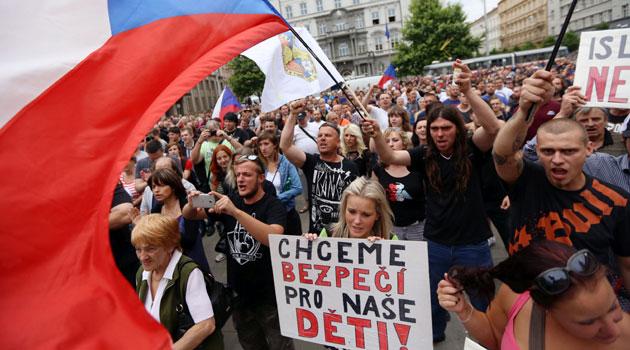Czech Interior Ministry's quarterly report on extremism says militia groups are collaborating with MPs

During the first quarter of this year in the Czech Republic, extremist entities held 93 events, 20 more than during the same period last year, but the extremist scene was calm and without extraordinary occurrences. Czech security forces did not discover any indications of an increased risk of violent activities connected with the actions of extremist political movements.
Those are the findings of the quarterly report on extremism published online by the Czech Interior Ministry. The extreme right is said to be making public appearances that are inconsistent and lack unity.
The Workers’ Social Justice Party (Dělnická strana sociální spravedlnosti- DSSS), according to the Interior Ministry, has all but cleared out the public arena and the National Democracy party gave up on making any more significant public appearances during the first quarter of this year, doing its best instead to occupy the main position inside the extreme right scene. “For that purpose, [National Democracy] has attempted to begin collaborating with entities and individuals connected with the neo-Nazi movement,” the report states.
The security forces also noted several closed, secret concerts of so-called White Power music intended for backers of the neo-Nazi movement. According to the Interior Minister, this is a new trend, as the organizing of such events had been waning since 2009.
“In terms of genre, these concerts featured the styles of hatecore or National Socialist hardcore. So-called hatecore bands vigorously disseminate hatred and promote neo-Nazism,” the ministry reports.
Right-wing entities organized 40 events between January and the close of March, eight more than last year, while on the left-wing part of the extremist spectrum the most significant role was played by anarchists, whom the Interior Ministry says did their best to actively support the Klinika center in Prague. “The anarchists also focused on support for their fellow tribe members who have been prosecuted, especially Lukáš Borel, who is being prosecuted, or Igor Ševcov, who has been convicted. In both cases activists have questioned the reasons for the prosecution of these individuals and have done their best to depict them as martyrs,” the report states.
The extreme left organized 53 events during the first quarter of this year, 20 more than at this same time last year, and the report also focused on militia and paramilitary groups in the Czech Republic, whose activities reflected the deteriorating security situation in Ukraine during February. “Traditionally, that topic is focused on by the Czechoslovak Reserve Soldiers for Peace (Českoslovenští vojáci v záloze za mír) and the National Militia (Národní domobrana) groups. Representatives of both groups are directly in contact with representatives of the [Russian-backed] separatist republics [in Ukraine],” the report states, adding that disputes have arisen within the National Militia group about its future political direction.
“Some members [of National Militia] preferred to keep their activities at an apolitical level, but others have collaborated with National Democracy or, in a smaller number of cases, with the DSSS. An alarming fact is that some members of the National Militia group have collaborated with some members of the political parties seated in Parliament,” the report states.
Police recorded 32 crimes with an extremist subtext between the beginning of January and the close of March this year, three more than during the first quarter of 2016. Most frequently these crimes were committed in the Ústecký Region (nine cases).
Six of the criminal cases were recorded by police as happening in Prague. No extremist crimes were reported from the Central Bohemian, Karlovy Vary, Olomouc or Pardubice Regions during the first quarter of 2017.
